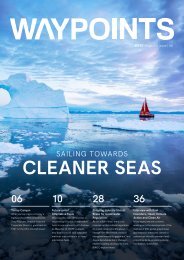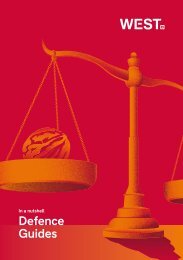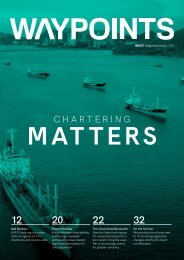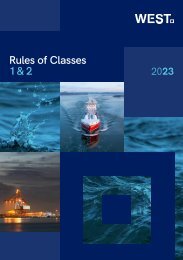Waypoints: Under Attack
Our launch issue is a cyber-themed special which examines the constant and ever-increasing threat of cyber exposures, and suggests measures by which maritime organisations can mitigate the potential damage to their business. Also included are features on the impact of the pandemic upon seafarers; the encouraging role played by big data within the shipping industry; what can be done to prevent tanker explosions; the advantages offered by electronic bills of lading; plus the first of our regular profiles of West offices in different territories, as well as a round-up of current legal cases.
Our launch issue is a cyber-themed special which examines the constant and ever-increasing threat of cyber exposures, and suggests measures by which maritime organisations can mitigate the potential damage to their business. Also included are features on the impact of the pandemic upon seafarers; the encouraging role played by big data within the shipping industry; what can be done to prevent tanker explosions; the advantages offered by electronic bills of lading; plus the first of our regular profiles of West offices in different territories, as well as a round-up of current legal cases.
Create successful ePaper yourself
Turn your PDF publications into a flip-book with our unique Google optimized e-Paper software.
24 Issue 01 WAYPOINTS<br />
WAYPOINTS Issue 01 25<br />
Electronic<br />
bills of lading:<br />
A GOOD<br />
IDEA ON<br />
PAPER?<br />
We consider the advantages of eBills over paper<br />
bills, and outline their status as regards Club cover<br />
Chris Ward<br />
Claims Manager, West P&I<br />
What are the advantages of eBills?<br />
■ Security: It is substantially harder to falsify an eBill<br />
than it is to produce a counterfeit paper bill due to<br />
security measures such as PIN numbers, subscription<br />
keys, electronic signatures and audit trails. The latter<br />
enable users to monitor every stage of a transaction so<br />
that if the documentation is altered, the technology will<br />
reveal when these changes were made and who was<br />
responsible for making them.<br />
The emergence of eBill systems which use blockchain<br />
technology is another positive development. In this<br />
context, blockchains are private or public digital<br />
networks which are used to generate and maintain<br />
a distributed record of all transactions in encrypted<br />
but auditable form (as opposed to a centrally<br />
maintained record of transactions). In security terms,<br />
transferring eBill documents over a public blockchain<br />
network acts as a deterrent to hackers, as unlike<br />
private blockchains there is no single centralised<br />
administration point to attack.<br />
■ Savings: The simplicity of electronic transfer greatly<br />
diminishes the administration costs associated with<br />
preparing and physically couriering paper bills of<br />
lading. Similarly, eBills reduce the outlay related<br />
to error correction, as unlike paper bills, electronic<br />
documents can easily be cancelled and reissued with<br />
the correct information.<br />
■ Speed: The immediacy of the digital format allows<br />
all relevant tasks, such as the administrative and<br />
corrective measures outlined above, to be completed<br />
at a stroke, avoiding delay and generating further<br />
costs savings. The process allows an eBill to rapidly move<br />
along the chain and be waiting at the discharge port well<br />
in advance of the arriving vessel, circumventing the need<br />
to rely on letters of indemnity with all the inherent legal,<br />
commercial and insurance risks they carry.<br />
And what are the disadvantages?<br />
■ Inevitably, new technologies present new opportunities<br />
for determined fraudsters.<br />
■ Hackers – or corrupt operatives with internal access –<br />
could feasibly tamper with existing eBills or create their<br />
own fake documentation, which would then be identified<br />
by the system as authentic.<br />
■ Concern has also been expressed about the danger<br />
of defective or pirated encryption software leaving<br />
systems exposed.<br />
■ Legal recognition of eBills varies by jurisdiction and is by no<br />
means guaranteed or consistent. Clearly, any transactions<br />
need both counterparties (as well as third parties involved in<br />
the transaction, eg endorsees of negotiable bills of lading)<br />
to agree to the use of eBills. The absence of congruous and<br />
compatible governance* between legal systems has limited<br />
eBill usage to date, largely confining them to intra-group<br />
trading or transactions between trusted counterparties.<br />
* Article 8(a) of the United Nations’ ‘Rotterdam Rules’ recognises the<br />
legal equivalence of eBills to paper bills, but very few countries have<br />
adopted this Convention.<br />
Click here to see West’s claims guide<br />
to electronic bills of lading<br />
Bills of lading have been in use for longer<br />
than even amateur historians might suspect.<br />
The first known written example dates from<br />
1564, the year in which William Shakespeare<br />
and Galileo Galilei were born.<br />
Whilst they have been central to<br />
international maritime trade for hundreds of<br />
years, paper bills are highly susceptible to<br />
documentary fraud. Loading dates or places<br />
may be altered, the weight, condition and<br />
contents of cargoes may be falsified or, in<br />
extreme cases, funds or entire shipments<br />
may be diverted away from their intended<br />
recipients into criminal hands.<br />
Fortunately, e-commerce technology has<br />
presented shippers and carriers with a<br />
viable alternative in the shape of electronic<br />
bills of lading (eBills).<br />
What are eBills?<br />
First mooted in the 1980s, eBills have<br />
steadily achieved market share in sectors<br />
including dry bulk and container shipping.<br />
The function of eBills is identical to that<br />
of their paper predecessors, namely:<br />
■ They act as a document of title to the<br />
cargo, establishing the legal rights and<br />
liabilities of the holder of the eBill in<br />
relation to the cargo;<br />
■ They contain and/or evidence the<br />
contract of carriage and its terms;<br />
■ They represent a receipt for the<br />
shipper’s delivery of the cargo to<br />
the carrier.<br />
Are trades using eBills covered by Club P&I insurance?<br />
Since February 2010, and supported by a standard<br />
charterparty clause introduced by BIMCO in November<br />
2014, the International Group of P&I Clubs has provided<br />
cover for the use of eBills on specifically approved<br />
systems. Six such systems, each with its own user<br />
agreement, have been approved by the IG:<br />
■ essDOCS<br />
■ Bolero<br />
■ E-Title<br />
■ edoxOnline<br />
■ WAVE<br />
■ CargoX<br />
For the purposes of Club cover, any liability arising<br />
under an eBill issued under any of these systems is<br />
treated just as it would be with a paper bill and is<br />
Chris Ward<br />
Claims Manager,<br />
West P&I<br />
E Chris.Ward@Westpandi.com<br />
subject to the same policy exclusions. However,<br />
liabilities arising where an unapproved system has<br />
been used are not treated in the same way; cover<br />
will only apply if the Members can demonstrate<br />
that the liability would have arisen even if a paper<br />
bill had been used. Members should, therefore,<br />
be careful to only use approved systems.**<br />
It is also important to stress that the cyber risks<br />
highlighted above would not fall within P&I cover.<br />
**An additional system, CT-e/DANFE, applies to Brazil’s cabotage<br />
trade, but is regarded by IG Clubs as exempt from paper trading<br />
policy exclusions, so Club cover for P&I is unaffected for Members<br />
using this system.<br />
A qualified English solicitor, Chris joined the club<br />
in September 2020 as a Claims Manager for the<br />
European Team, handling P&I and FD&D claims<br />
for members in Europe and India.










